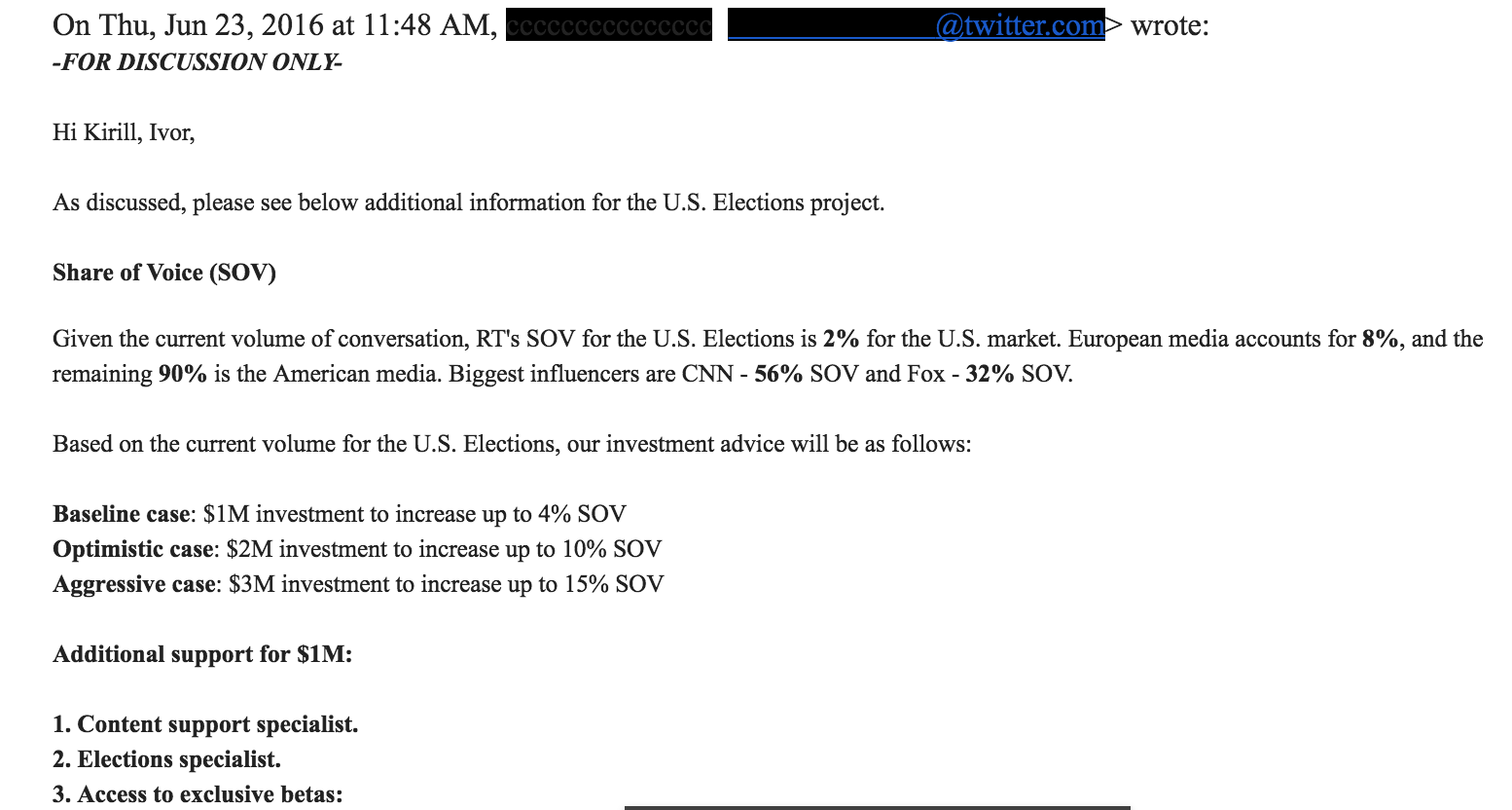Please let Mueller drop an indictment on November 4th. PLEASE!!!!
You are using an out of date browser. It may not display this or other websites correctly.
You should upgrade or use an alternative browser.
You should upgrade or use an alternative browser.
RUSSIA/РОССИЯ THREAD—ASSANGE CHRGD W/ SPYING—DJT IMPEACHED TWICE-US TREASURY SANCTS KILIMNIK AS RUSSIAN AGNT
- Thread starter ☑︎#VoteDemocrat
- Start date
More options
Who Replied?Damn, I didn't know it was organized like that. People literally clocking in to work everyday and being assigned different forums to troll.

Makes you wonder how many posters in here are on long-term assignments. But that's none of my business tho

Poetical Poltergeist
Precise and cold hearted
Very calm, bigly calm.
A bad carpenter blames his tools.
No pun.
Very calm, bigly calm.
He's not angry. Actually, he's enjoying this :scumbag:


Twitter Offered Russian TV Network 15% Of Its Total Share Of US Elections Advertising
Twitter Offered Russian TV Network 15% Of Its Total Share Of US Elections Advertising
A Russian news outlet described by the US intelligence community as "the Kremlin’s principal international propaganda outlet" was once a top sales prospect for Twitter's US elections ad team.
Alex KantrowitzNovember 1, 2017, at 4:15 p.m.

Twitter wanted RT to spend big ahead of the 2016 US election, offering a significant portion of its election-related ad inventory in return. The social media company offered the Russian state–owned television network up to a 15% share of voice ("SOV") on US election advertising — or the percent of all ads run on that topic — for $3 million.
RT's share of voice was 2% at the time of the pitch, according to a June 2016 email from a Twitter sales executive to RT staff members that RT shared with BuzzFeed News. The $3 million spent would multiply RT's share of voice more than sevenfold, but still leave it short of CNN's 56% and FOX's 32%. RT declined the offer.
"We do not have any comment on our private conversations with any advertiser, even a former advertiser," a Twitter spokesperson said. Twitter did not dispute the email’s validity.
After courting RT's ad dollars during the 2016 election, Twitter reversed course last week when it said it would prohibit accounts owned by the network from advertising on its platform: "This decision was based on the retrospective work we've been doing around the 2016 U.S. election and the U.S. intelligence community’s conclusion that both RT and Sputnik attempted to interfere with the election on behalf of the Russian government."
The intelligence report Twitter referenced called RT "the Kremlin’s principal international propaganda outlet."
Both the Russian government and WikiLeaks played important roles in the 2016 US presidential election. WikiLeaks published a trove of hacked emails from Democratic presidential nominee Hillary Clinton, the Democratic National Committee, and top Clinton adviser John Podesta. Russia-backed hackers are suspected of illegally obtaining and handing over those emails. Special Counsel Robert Mueller is currently investigating members of the Trump campaign for possible collusion with the Russian government during the campaign. And the Kremlin-linked Internet Research Agency tried to influence the election and sow discord in its aftermath via a widespread campaign on social media.
At an open Senate hearing Tuesday, Twitter, Facebook, and Google were pressed for answers on why they didn't see Russian election meddling taking place inside their platforms. "I want to understand why no one seems to have caught on to the Russian effort earlier," Minnesota Sen. Al Franken said at the hearing.
All confessed their shortcomings, adding they were making fixes. Twitter's testimony explicitly noted the "off-boarding" of RT's accounts from its ad platform. And RT came up in both the Senate and House Intelligence Committee hearings dealing with Russian interference Wednesday.
RT may no longer be a Twitter customer now, as the company made clear at the hearings, but not long ago it was a multimillion-dollar sales prospect.
@DonKnock @SJUGrad13 @88m3 @Menelik II @wire28 @smitty22 @Reality @fact @Hood Critic @ExodusNirvana @Blessed Is the Man @THE MACHINE @OneManGang @dtownreppin214 @JKFrazier @tmonster @blotter @BigMoneyGrip @Soymuscle Mike @Grano-Grano @.r. @GinaThatAintNoDamnPuppy!
88m3
Fast Money & Foreign Objects
Dorian Breh
Veteran
Sorta unrelated but: How this company got the market cap it does if 15% of election ads is $3Ms and they were out there soliciting that deal?
How much for the whole thing? $25? Weird to me
.
How much for the whole thing? $25? Weird to me
.
Kushner and Jr. in cuffs. One can dream.


A bad carpenter blames his tools.
No pun.
You mean a 35 year old trust fund baby with zero government experience and who saddled the family businesses with billions in debt, gives bad advice?

Trump will throw everyone under the bus before it's all said and done.
I'm disgusted with Kelly's comments on the night of the indictments. We're talking about Russia stoking division when we should talk about these WS in the WH. But that's for another day.
Hood Critic
The Power Circle
Is there any doubt Flynn mapped it all out for Mueller?
Kushner and Jr. in cuffs. One can dream.
I'm just imagining Jeff Sessions getting indicted for lying under oath at the Senate hearing a couple months ago. The fukkery would be next level.

Mueller probably already has dude on his speed dial.

Hood Critic
The Power Circle
Has anyone in the administration been asked to address this today?

 :Cacfukkery:
:Cacfukkery:

